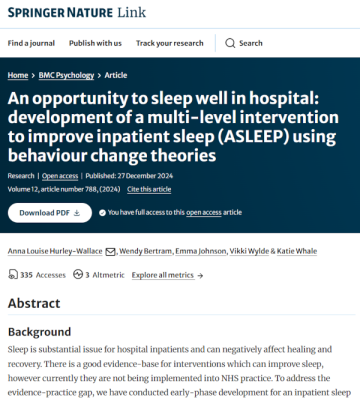How can sleep in hospital be improved?
- 14 January 2025
Factors that could be changed to help patients sleep better in hospital are revealed in a newly published paper in BMC Psychology. The Asleep study examined how sleep could be improved for people in NHS hospitals recovering from surgery.
The research team, based at the NIHR Bristol Biomedical Research Centre and Musculoskeletal Research Unit at the University of Bristol, worked through four phases of the study. The aim was to develop a set of recommendations to improve patients’ sleep on wards.
First, the researchers worked with patients to understand their experiences of sleeping on wards. Then they surveyed staff to understand the sleep environment and sleep-related practices on wards, identifying areas for change.
The team then held meetings with senior ward staff and managers to look at the areas identified. This aimed to understand what could feasibly be changed to improve sleep for patients. Finally, the team mapped out these factors that could be changed, highlighting where the power to make such changes was held.
From beeping equipment to slamming doors and bin lids, the researchers identified 18 factors that could be changed in three areas: environment and equipment, staff awareness and behaviour, and patient awareness and behaviour.
They then developed the following recommendations:
- Environment and equipment:
- Lighting dimmed at night
- Ward equipment to be modified or replaced with low noise options (for example, soft close bins)
- Medical equipment used with night mode if available (for example, call bells)
- Staff awareness and behaviour:
- Staff noise reduction (non-clinical conversations)
- No electronic device noise between 11pm-6am
- Patient awareness and behaviour:
- Provide patient sleep packs, including sleep aids, relaxation resources and information leaflets
- Patient noise reduction and a ‘quiet time’ policy between 11pm-6am
The researchers will develop these recommendations into an Asleep toolkit to help ward staff implement these changes.
Dr Katie Whale, Health Psychologist and Asleep study lead, said:
“Almost everyone who has spent a night in hospital will tell you what a difficult environment it is to get a proper night’s rest, but good sleep helps people heal and recover from surgery and illness. With the Asleep study, we want to understand what is stopping people from sleeping, and how we can change the ward environment to promote better sleep.
“We found there are some straightforward changes that could help, which mostly focus on reducing noise. This includes slamming doors and bin lids, televisions and personal devices, and loud talking. We are now starting the next part of the project working with NHS staff and patients to design a toolkit which can be used on wards to address these issues.”
Professor Mike Whitehouse, Consultant Orthopaedic Surgeon, said:
“As an orthopaedic surgeon I recognise the crucial need to support patients in their preparation for, and recovery from joint replacement surgery. Sleep is fundamental to recovering from operations, and affects patients’ ability to heal. Furthermore, sleep loss after surgery hinders engagement in rehabilitation which is central to the joint replacement care pathway.
“I have seen first-hand the impact of the ward environment on patients’ sleep, and strongly believe that the Asleep toolkit will be of great benefit to patients, staff, and the NHS.”
